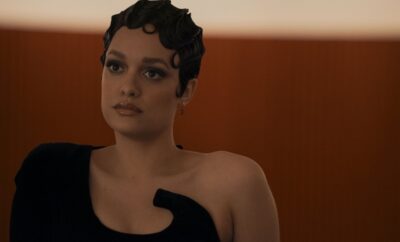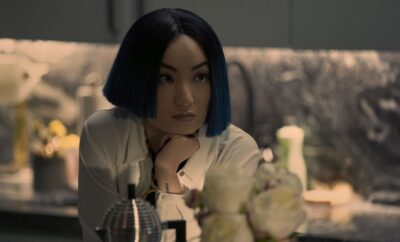Movie Reviews
My Cousin Rachel
By: Arlene Allen
My Cousin Rachel is a conundrum of a film. A psychological thriller based on Daphne Du Maurier’s 1951 novel, this new adaptation has many things that work against it as it does for it. It is very true to the book’s theme and ambiguity, but begs the question: does it stand the test of time? The answer is as vague as Cousin Rachel herself.
The film’s opening depicts young Philip, an orphan who is raised by his cousin Ambrose in an environment weirdly devoid of women (“the only females allowed in the house were the dogs”). As an adult, Philip (Sam Claflin) eventually goes away to school where he discovers he doesn’t like books or big cities and the viewer begins to wonder if he doesn’t really find he likes women. However, when he returns home he discovers Ambrose took to the south of Italy for health reasons and ended up marrying the mysterious Rachel (Rachel Weisz).
The rest of the story plays out in ambiguous detail. Ambrose’s letters home become increasingly fragmented, tormented and terrified. “She has done for me at last, Rachel my torment,” pens Ambrose in his final missive. Philip becomes convinced that Rachel has killed his cousin. When he learns of her planned visit, he becomes obsessively bent on vengeance and torment of his own. However unbalanced we’re led to believe Rachel is, it is Philip who is equally deranged.
Persuaded into kindness by his guardian Mr. Kendall (“Game of Thrones” star Iain Glenn) and his daughter Louise (Holliday Grainger, who worked with Claflin in On Stranger Tides), Philip eventually lets Rachel into his house and into his life. In short order, we come to find out that Rachel is not at all the venomous viper that both Ambrose and Philip led us to believe. She’s kind, charming, free-spirited and very beautiful and it doesn’t take anyone long to fall under her spell.
A game of cat and mouse ensues, but who is the cat and who is the mouse? Therein lies part of the problem. What worked with audiences in 1951 doesn’t pull the same strings on audiences today. While never predictable, the back and forth of the did-she-didn’t-she begins to wear thin. Having read the book as a young woman (and loving it), I had wondered if the script would keep the ambiguity of the novel and it does. In doing so; however, it makes Philip quite unsympathetic and demented. How can anyone be so naïve, grudging and so bitterly vindictive, even when he claims to be in love with Rachel?
Rachel fares better – and Weisz captures her beautifully – as a woman with a passionate soul trapped by social mores and restrictions. Widowed before marrying Ambrose, she already faced stigma for her “wild” behavior. She is suitably mysterious and beguiling. However, if I hadn’t read the book, I may not have even picked up on that theme. It’s so subtle, you barely realize it’s there at all, even though Rachel cries out for understanding: “Can you not let me be a woman in my own right?” she pleads with Philip.
The overall problem both characters face is after a while you stop caring about either one of them. I’m not absolutely certain where the fault lies; is it the pacing, the script or the portrayals that lead to such a “meh” reaction to either Philip or Rachel? Are there so many twists and turns you simply stop caring about what happens?
When the novel was published, Du Maurier said she had “become” Philip as she wrote the novel. This passion does not translate at all onto the screen. It certainly looks beautiful as the set designers, costumers and director went to great lengths to get every detail as historically accurate as possible and the film should certainly be commended for that. I really think both Weisz and Claflin try very hard; especially Weisz who seems very comfortable in Rachel’s shoes.
Director/screenwriter Roger Michell attempts to give us a woman with modern, 21st century sensibilities, but maybe that’s why there seems to be such a distance between the character and the audience. We didn’t need to see a woman from 2017 trying to fit into the 19th century. We needed to see a woman from the 19th century trying to fit into a narrow worldview and defying it.
Part of me really liked that Michell kept the open-endedness of the book intact. I loved all of the period set pieces and historical detail. I both liked and disliked Rachel, which was as it should, but I didn’t quite feel the sympathy that I did for the book’s heroine. Philip became unfathomable, but I think this is due in part to the fact that his sexual identity lay simmering below the surface in the book while he is an out-and-out creeper in the film (the sex scene between him and Rachel in the woods is just so wrong on so many levels).
This seems to be an all too common problem with adaptations these days. Sometimes asserting modern sensibilities into classic novels just doesn’t always work, especially when the novel needed no such interference.
Final analysis: If this review leaves you befuddled, wait until you see the film. C+





You must be logged in to post a comment Login